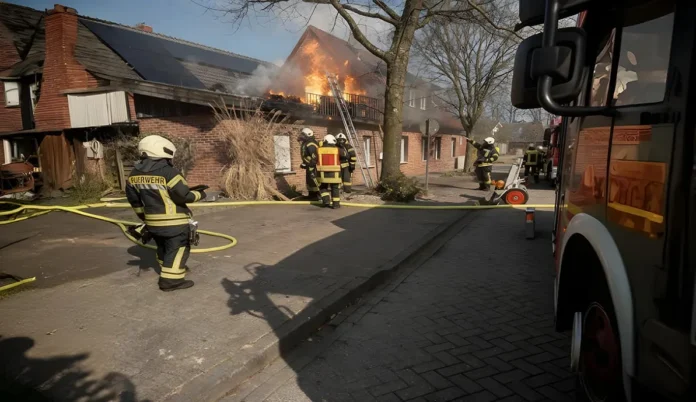Residential Fire Raises New Alarm Over the Safety of “Green Energy” Battery Storage
BERLIN, Germany — A quiet neighborhood in Germany was thrown into chaos this week after a lithium-ion balcony battery storage system burst into flames, igniting a dangerous fire that tore through a residential apartment building.
Authorities say the blaze started when the small home energy system, designed to store solar power for personal use, suddenly overheated and exploded. Within minutes, flames engulfed the balcony and spread to the upper floors, forcing residents to evacuate and leaving firefighters battling a stubborn and toxic inferno.
“It was terrifying,” said one witness. “We heard a loud pop, and then the whole balcony was burning. The smoke was black and thick — you could barely breathe.”
The incident, which occurred in the early evening, is now under investigation. Officials have confirmed that the cause was linked to a faulty lithium-ion battery inverter, part of a balcony solar storage unit that is increasingly popular among homeowners seeking to cut energy costs.
Balcony battery systems have been marketed across Europe as a symbol of the renewable energy revolution, offering small, efficient, and environmentally friendly solutions. But safety experts warn that these systems come with serious risks that manufacturers often downplay.
Lithium-ion batteries, which power these devices, are known for their volatility. If damaged, overcharged, or exposed to heat, they can initiate a chemical chain reaction known as thermal runaway, resulting in explosions and fires that are nearly impossible to extinguish.
“The technology is not as safe as people think,” said fire safety expert Klaus Heinemann. “Once a lithium battery catches fire, you can’t just put it out with water. It burns from the inside, and the toxic gases it releases are extremely dangerous.”
This latest incident in Germany contributes to a disturbing trend of lithium battery-related fires worldwide. From power plants in California to homes in Australia and high-rise buildings in Nigeria, similar stories have emerged, fires caused by batteries that were meant to make energy safer and cleaner.
In Germany alone, fire departments have reported a significant increase in calls related to household energy storage units. Many of these systems, imported from low-cost manufacturers, lack the rigorous safety certifications needed for long-term operation.
“We are importing danger under the label of sustainability,” Heinemann warned. “Consumers believe they’re helping the planet, but they’re unknowingly installing fire hazards in their homes.”
Consumer safety advocates are now urging the German government to impose stricter standards on the production and installation of lithium-ion battery systems. They’re also calling for public education campaigns to warn homeowners of the potential dangers.
“This is not an isolated case, it’s a growing problem,” said consumer rights spokesperson Anna Vogel. “People deserve to know the truth about these batteries before more lives are put at risk.”
As the push for green energy accelerates, the German balcony fire serves as a stark reminder that technology marketed as safe and sustainable may, in fact, be fueling a dangerous global fire problem.
The promise of clean energy should not come at the cost of consumer safety; yet, lithium-ion batteries continue to prove that when mishandled or poorly manufactured, they can turn homes into firetraps.
Read the Latest Battery News Shaping the Global Power Market
Lithium Battery Catches Fire in German Home Balcony System- Source


